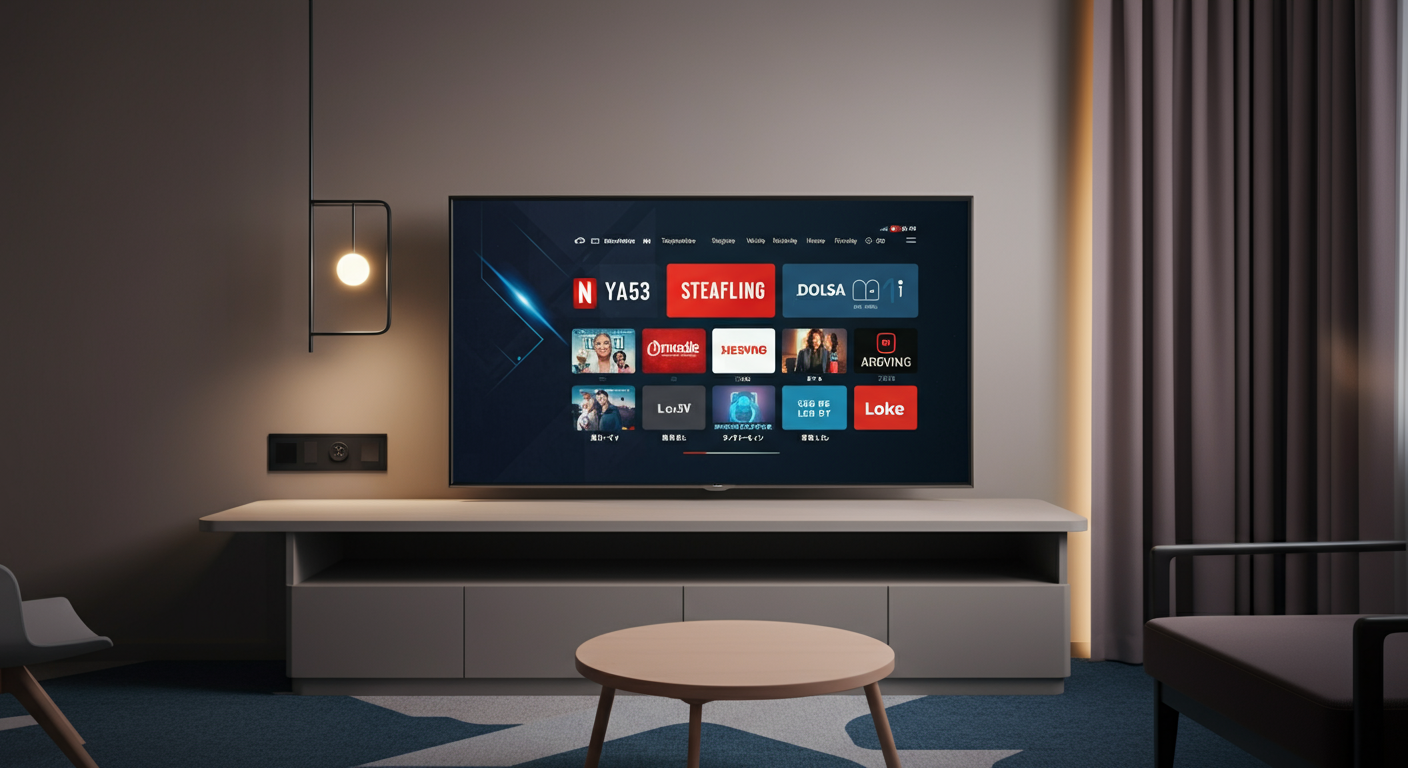In the ever-evolving world of hospitality, staying ahead of the curve is crucial for businesses seeking to enhance their customer experience. One significant area of transformation is the realm of Hospitality TV Packages Trends. As technology advances, so do the expectations of guests, who now demand more immersive and personalized entertainment options during their stay. This shift presents both opportunities and challenges for hotels, casinos, restaurants, and other hospitality venues aiming to create memorable experiences.
With the rise of interactive and smart TV technologies, the landscape of hospitality entertainment is undergoing a remarkable transformation. Gone are the days when a basic cable package sufficed; today’s guests expect a seamless integration of streaming services, on-demand content, and interactive features that mimic the comforts of home. According to industry experts, the integration of over-the-top (OTT) platforms and voice-activated technologies is not just a trend but a necessity for modern hospitality businesses.
DLM Media, a leader in commercial video programming solutions, understands the importance of delivering high-quality content tailored to the needs of diverse industries. Their commitment to providing a worry-free experience with reliable signal delivery ensures that businesses can offer their guests a cutting-edge entertainment experience. As we delve into the latest trends shaping the future of hospitality TV packages, you’ll discover how these innovations can elevate your business’s entertainment offerings and enhance customer satisfaction.
Stay with us as we explore the key trends in hospitality TV packages, from the integration of smart technologies to the importance of curated content. Whether you’re a multi-location organization or a single venue, understanding these trends will empower you to make informed decisions and stay ahead in this competitive landscape.
Innovative Content Options for Hospitality TV
In the rapidly evolving hospitality industry, staying ahead of Hospitality TV Packages Trends is crucial for enhancing guest experiences. With the rise of over-the-top (OTT) applications, hotels are now integrating popular streaming services like Netflix and Hulu into their entertainment offerings. This shift not only meets the growing demand for personalized content but also transforms the way guests interact with in-room entertainment.
By embracing these innovative content options, hotels can provide a more immersive and personalized experience, akin to what guests enjoy at home. According to industry insights, the integration of commercially licensed smart applications is becoming increasingly popular, allowing guests to access a wide range of content options directly from their hotel room.
Integration of OTT Applications
OTT applications have revolutionized the hospitality TV landscape by offering guests access to a plethora of streaming services. Hotels are now leveraging platforms like Netflix, Hulu, and Amazon Prime to provide guests with the content they love. This integration not only enhances guest satisfaction but also aligns with the trend of personalized entertainment experiences.
For instance, Marriott International has successfully implemented Netflix in many of its properties, allowing guests to log into their accounts and continue watching their favorite shows. This approach has proven to be a significant draw for tech-savvy travelers who prefer streaming services over traditional cable TV.
Benefits of Smart Applications
Smart applications offer numerous benefits for both guests and hotel operators. These apps provide a seamless user experience, enabling guests to easily navigate through various content options. Additionally, they offer hotels the opportunity to gather data on guest preferences, helping them tailor their services to meet individual needs.
Some key benefits of integrating smart applications include:
- Enhanced guest satisfaction through personalized content.
- Increased engagement with interactive features.
- Opportunities for upselling additional services directly through the TV interface.
Demand for Personalized Content
The demand for personalized content is driving the adoption of OTT services in the hospitality sector. Guests now expect the same level of customization they experience at home, with the ability to choose what they watch and when they watch it. This trend is supported by statistics showing a significant preference for streaming services over traditional TV among hotel guests.
According to a report by Sonifi Solutions, guests averaged five casting sessions per stay, consuming approximately five hours of streamed content. This data underscores the importance of offering a diverse range of content options to cater to varying guest preferences.
By embracing these Hospitality TV Packages Trends, hotels can not only enhance their entertainment offerings but also create a more engaging and memorable guest experience. For more insights on how to elevate your hospitality business, explore our other articles on DLM Media’s website.
Integration of AI and Voice Technology in Hospitality TVs
The integration of AI and voice technology is revolutionizing the hospitality industry, transforming how guests interact with in-room entertainment systems. As part of the broader Hospitality TV Packages Trends, these advancements offer hotels a unique opportunity to enhance guest convenience and satisfaction. By incorporating AI platforms and voice-activated devices, hospitality businesses can provide a more personalized and seamless entertainment experience.
AI and voice technology enable guests to control their TV systems with simple voice commands, creating an intuitive and hands-free experience. This innovation not only meets the growing demand for convenience but also aligns with the trend of smart home technologies extending into hospitality settings. As guests become accustomed to using voice assistants like Amazon Alexa and Google Assistant at home, they expect similar functionalities during their hotel stays.
Examples of Successful AI and Voice Technology Integration
Several hotels have successfully integrated AI and voice technology into their TV systems, setting a benchmark for others in the industry. For instance, the Wynn Las Vegas has equipped its rooms with Amazon Echo devices, allowing guests to control lighting, temperature, and entertainment options using voice commands. This integration has significantly enhanced the guest experience by offering a personalized and interactive environment.
Another notable example is the Marriott International, which has partnered with Samsung and Legrand to pilot a smart room concept. This initiative incorporates voice-activated controls for various room functions, including entertainment, providing guests with a futuristic and convenient stay. Such implementations highlight the potential of AI and voice technology to redefine hospitality experiences.
Benefits and Potential Privacy Concerns
The benefits of integrating AI and voice technology in hospitality TVs are manifold. Guests enjoy increased convenience and a more personalized experience, while hotels can gather valuable data on guest preferences to tailor their services. This data-driven approach enables hotels to enhance guest satisfaction and loyalty by offering customized content and services.
However, the adoption of these technologies also raises potential privacy concerns. Guests may worry about the security of their personal information and the possibility of unauthorized data access. To address these concerns, hotels must implement robust security measures and clearly communicate their data protection policies to reassure guests. Transparency and trust are crucial in ensuring the successful integration of AI and voice technology in hospitality settings.
As the hospitality industry continues to evolve, the integration of AI and voice technology in TV systems will play a pivotal role in shaping the future of guest experiences. By embracing these innovations, hotels can stay ahead of the curve and meet the growing expectations of tech-savvy travelers.
The Impact of Display Technology on Guest Satisfaction
In the competitive world of hospitality, enhancing guest satisfaction is paramount. One area where significant improvements can be made is in the quality of in-room entertainment, particularly through advancements in display technology. As guests increasingly expect a home-like experience during their stay, the integration of cutting-edge display technologies such as 4K and OLED screens has become essential.
High-quality displays not only elevate the visual experience but also align with the growing consumer expectations for superior picture quality and immersive viewing. As the hospitality industry embraces these advancements, hotels that invest in upgrading their display technology are likely to see a boost in guest satisfaction and loyalty.
Enhancing the Viewing Experience with 4K and OLED
4K and OLED screens represent the pinnacle of display technology, offering unparalleled picture clarity and vibrant colors. These technologies provide a more immersive viewing experience, which is crucial for meeting the entertainment needs of modern travelers. According to industry experts, the shift towards 4K displays in hotel rooms is a natural progression, mirroring consumer trends where high-resolution screens are becoming the norm in homes.
For instance, many luxury hotels have already begun incorporating 4K and OLED displays into their guest rooms. This upgrade not only enhances the aesthetic appeal of the room but also significantly improves the overall guest experience. By offering crystal-clear images and rich colors, these displays ensure that guests can enjoy their favorite shows and movies in the highest quality possible.
Case Studies: Hotels Embracing Display Upgrades
Several hotels have successfully upgraded their display technology, setting a benchmark for others in the industry. For example, the Grand Hyatt in New York City recently installed OLED screens in all its rooms, resulting in overwhelmingly positive feedback from guests who appreciated the enhanced viewing experience. Similarly, the Ritz-Carlton in Los Angeles has adopted 4K displays, further cementing its reputation for luxury and innovation.
These case studies highlight the tangible benefits of investing in advanced display technology. By prioritizing guest satisfaction through superior in-room entertainment, these hotels have not only improved their guest ratings but also increased return visits and positive word-of-mouth referrals.
Aligning with Consumer Expectations
Today’s consumers are accustomed to high-quality displays in their personal lives, whether through their smartphones, tablets, or home televisions. As a result, they expect the same level of quality during their hotel stays. By aligning with these expectations, hotels can differentiate themselves from competitors and create a more memorable guest experience.
Investing in display technology is not just about keeping up with trends; it’s about understanding and meeting the evolving needs of guests. As the hospitality industry continues to innovate, those who prioritize display quality will likely see significant returns in terms of guest satisfaction and loyalty.
For more insights on how to enhance your hospitality offerings, explore our other articles on DLM Media’s website.
Embracing the Future of Hospitality TV
As we navigate the evolving landscape of Hospitality TV Packages Trends, it becomes clear that embracing these changes is not just an option but a necessity for the hospitality industry. The integration of innovative content options, such as over-the-top (OTT) applications and smart technologies, is transforming guest experiences. By offering personalized content and interactive features, hotels can significantly enhance guest satisfaction, meeting the modern traveler’s expectations for home-like comforts during their stay.
The adoption of AI and voice technology further elevates the hospitality experience, providing guests with a seamless and intuitive way to interact with their in-room entertainment. This not only enhances convenience but also aligns with the growing trend of smart home technologies becoming prevalent in hospitality settings. Ensuring robust data security measures will be crucial in addressing any privacy concerns, thereby fostering trust and assurance among guests.
Moreover, advancements in display technology, such as 4K and OLED screens, are setting new standards for visual excellence in guest rooms. These technologies offer a vibrant and immersive viewing experience, crucial for captivating today’s tech-savvy guests. By investing in these display upgrades, hotels can align with consumer expectations and differentiate themselves in a competitive market.
- Integrate OTT Applications: Leverage popular streaming services to offer personalized content.
- Adopt AI and Voice Technology: Enhance guest convenience with voice-activated controls.
- Upgrade Display Technology: Invest in 4K and OLED screens for superior visual quality.
As the hospitality industry continues to evolve, it is imperative for businesses to assess their current TV offerings and consider upgrades that align with these emerging trends. By doing so, you can not only enhance your guests’ experience but also stay competitive in this dynamic landscape. To explore more about how to elevate your hospitality business, visit DLM Media’s website for additional insights and resources.





